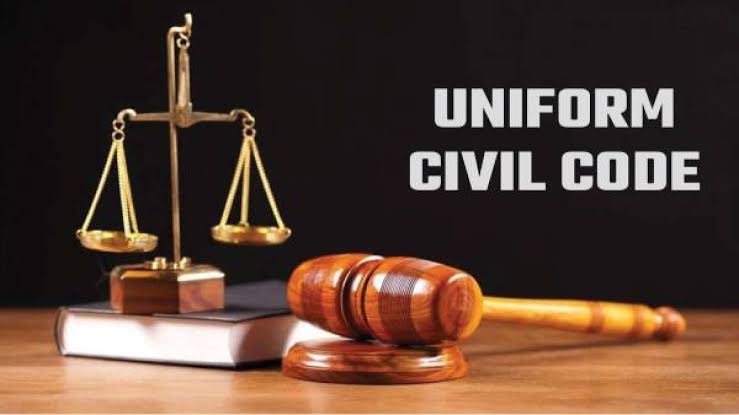Uniform Civil Code (Indian Express)

- 05 Feb 2024
Why is it in the News
The Uttarakhand Cabinet on Sunday approved the final draft of the Uniform Civil Code (UCC) without any changes, a day before the state Assembly convenes for a special session to take up the Bill.
What is Uniform Civil Code (UCC)?
- A Uniform Civil Code signifies a unified legal framework for the entire country, applicable across all religious communities concerning personal matters like marriage, divorce, inheritance, and adoption.
- The objective is to replace the current fragmented personal laws that govern interpersonal relationships within different religious communities.
Constitutional Framework:
- Article 44 of the Constitution mandates the State to strive for a Uniform Civil Code applicable to all citizens.
- Positioned in Part-IV as a Directive Principle, Article 44, while not justiciable, serves as a fundamental governance guideline.
- These principles, outlined in Article 37, provide overarching ideas for the State to consider in policy formulation and law enactment.
Current Landscape of Personal Laws:
- In the Concurrent list of the Constitution, matters such as marriage, divorce, and inheritance fall under both Parliament and state legislature jurisdictions.
- Hindu personal laws have been codified into four parts since 1956, while Muslim laws, not codified per se, draw from religious texts.
- Christians, Zoroastrians, and Jews are governed by their own personal laws. Goa stands as an exception, following the Portuguese Civil Code.
Need for Uniform Civil Code:
- A UCC aims to establish equal status for all citizens, addressing the inconsistency and lack of uniformity in personal laws across different religions.
- This inconsistency, conflicting with Article 14's Equality before the Law guarantee, often results in gender disparities.
Challenges and Criticisms:
- While advocating equality, the UCC concept raises concerns about potential clashes with the Right to Freedom of Religion (Article 25).
- Critics argue that separate personal laws uphold the right to practice one's religion, particularly crucial for minorities.
- Striking a balance, the Law Commission's 2018 report suggests preserving diversity in personal laws while ensuring alignment with fundamental rights.
The Way Forward:
- Encouraging a progressive mindset through education, awareness, and sensitization is vital for understanding the spirit of the UCC.
- Simultaneously, discriminatory personal laws should be amended or abolished.
- The Law Commission recommends codifying different personal laws to derive universal principles prioritizing equity, rather than imposing a blanket Uniform Civil Code
Uniform Civil Code (Indian Express)
- 11 Aug 2023
What is the News ?
The Kerala Legislative Assembly has unanimously adopted a resolution expressing its concern over the Union Government move to impose a Uniform civil code (UCC).
Facts About:
- The Kerala Assembly resolution essentially strikes a cautious note that a proposed “UCC could harm the secular nature of the country. “
- The resolution also talks about federalism – that the Centre could make a unilateral move on the contentious issue without consulting states.
- The resolution also argued that, it is critical to note that the Uniform Civil Code was limited to Directive Principles.
What does Constitution say about UCC?
- The Constitution refers to civil code only in its Directive Principles.
- Implementation of Directive Principles is not mandatory.
- The court may order to enforce Fundamental rights. But the Directive Principles of Article 44 of the Constitution cannot be enforced even by the courts.
Can the state legislate on UCC?
- Article 162 of the Constitution:
- The issue of personal laws falls in List III —the Concurrent List of the Seventh Schedule to the Constitution.
- While subjects in the Union lists fall within the purview of the Parliament, states can legislate on subjects in the State List.
- For entries in the ‘Concurrent List’, Article 162 of the Constitution gives state governments the power to legislate on subjects where a central law does not occupy the field.
- If there is a central law, it automatically gains precedence over the state law on the subject.
- Entry 5 of Concurrent List:
- Also the Entry 5 of the Concurrent lists “Marriage and divorce; infants and minors; adoption; wills, intestacy and succession; joint family and partition; all matters in respect of which parties in judicial proceedings were immediately before the commencement of this Constitution subject to their personal law.
- This allows states the power to legislate on the subject but only in the absence of a central law.
Do states can bring their own personal laws again?
The answer to it is NO, due to following cases;
- State laws on the issues mentioned in Entry 5 of the Concurrent List will not have precedence over central legislation.
- On specific areas not covered by central legislation, states can legislate.
- But central legislation already covers all aspects of marriage, divorce, inheritance and succession.
Supreme Court’s stand:
- The Court mentioned that Article 162 of the Constitution indicates that the executive power of a State extends to matters with respect to which the Legislature of the State has power to make laws.
- In view of the provisions of Entry 5 of the Concurrent List of the Seventh Schedule, the constitution of a Committee per se cannot be challenged as ultra vires.
Source: https://indianexpress.com/article/explained/explained-law/kerala-assembly-resolution-against-uniform-civil-code-8885558/#:~:text=The%20Kerala%20Legislative%20Assembly%20on,a%20common%20personal%20law%20code.
